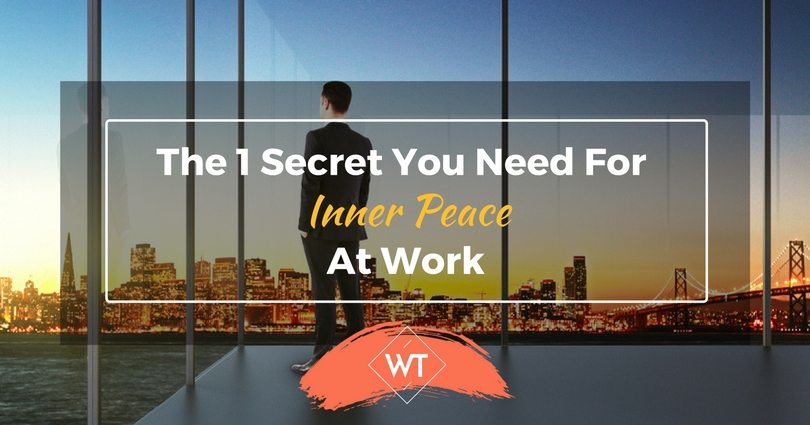The 1 Secret You Need For Inner Peace At Work

Phase Two – Inner Peace is to strengthen your base
In our Phase 1 on Inner Peace – The Self we looked for inner peace by finding inner silence. This isn’t meant to be a play on words. Peace is different than quiet. That’s why people always say they are looking for both, Peace and Quiet. Also, notice another part of that sentence. We looked for peace, by finding silence.
Once we had found our silent moment then we had some real chance of quieting our mind. From that beginning we can grow the rest of our foundation so that it can encompass the other areas of our life as well. For example: our job.
So now, in this phase and the next, I will show you how to carry that inner peace from Phase 1 over to your work, your friends, and your family. You will build more money in your life more easily. You will have a better quality of friends and an even stronger relationship at home. And you will do it all, while surpassing the known “experts” like Freud, Maslow, and even Von Clausewitz himself!
Because I am writing this over the weekend, let’s kick off Phase 2 by talking about the thing everyone loves to hate: Monday. Poor Monday, my little friend. What a shame that everyone trashes him. Maybe we can do something to change that.
Imagine that you were an amazing pianist and not only have you been playing for years, but that you love it, and squish it, and call it George. To you, playing the piano is the only thing that gives meaning to your week. If you could just play for even a very short time on a Monday, then the blues would all be chased away. For you, this is your moment—your saving grace. Your expression of true joy. In this case, yes . . . Monday isn’t the issue. It never was. It has become the day where you get to release your earthly bonds and float skyward on delicate notes of beautiful music.
“But I don’t play the piano,” you say. In fact neither do I. Though I wish I did sometimes. It seems incredible to me that some people play—and I do like Moonlight Sonata. Though I guess I don’t really like it enough to go learn it, and this is exactly the point I am making. My skill in this area lacks.
In the example I gave you, above (about the piano player), their skill level was exceedingly high, so against a case of Monday blues this has made a difference for that person. As it turns out, there is something to all of this. Something we can easily harness and use to our advantage.
Mihaly Csikszentmihalyi, the author of Flow: The Psychology of Optimal Experience says that when our skill level at something is high, and then on top of that we also find that we are challenged by something aimed at those skills, then we enter into something called the “flow state” where we become completely absorbed and nothing else seems to matter. People are at their happiest, here, he says. This is what it means to be “in the zone.”
When you are in the zone, hours will pass and you will take no notice. You will perform the activity for its own sake and not for any other reason. You will find true fulfillment as you lose yourself in your work. You may even feel giddy, as you ride the waves of this challenge. And when you are done, not coincidentally, you will have also risen to an even higher level in your skill.
Tell me, wouldn’t you like to experience this at your job? I would. I crave it like a junkie—though maybe a healthy, Zen-craving, junkie. Every time I think about that state, I want to be in it. But unlike in step one, where we just spend some time quieting our mind, in step two our inner actions alone are not enough to bring us there.
No, in this step we need to work for it a little bit more, but perhaps not like you think. We don’t need to work at it by just “doing more things at work.” That only results in burnout. Burnout is nowhere near the flow state. To achieve the flow state at work we need to either improve our skill-set and raise our skill-level, or we need to move to a different job where we already have a high level of skill. Here’s why, and it makes so much sense you’ll wonder why you hadn’t thought of it before.
To reach “Flow,” as we have already established, you need two things, right?
- You need a high level of skill, and
- You need a high level of challenge.
If you don’t have both at the exact same moment, it won’t work. Too much challenge and not enough skill is overwhelming. You can’t function properly so you shut down.
With airline pilots that can lead to something called task-saturation and they will literally fly into the side of a mountain, overwhelmed. They are not even panicked in the traditional sense, they are just trying to operate amongst too many things and they can’t handle it all at once. Mentally they shut down. Since crashing isn’t our goal, we know that too much challenge combined with not enough skill doesn’t work. Same with the reverse.
Too much skill and no challenge isn’t helpful either. Then you’re just coasting. That’s okay sometimes because we all need a break. In fact this can be a way to relax while you are at work. But there is no flow here. This isn’t the zone, it’s relaxation.
The same is true if both parts are at zero (or very low). You get no flow. In this case, when you have no skill and you have no challenge, you end up with apathy—a sort of “who cares” attitude that you can see on the face of certain teenagers working at the mall. Of course they look that way! Think of their set-up under the conditions we’ve just mentioned. They have no skill and no challenge. This is why they don’t care. I can explain it a bit further if you need me to.
You see, if they had skill, then that skill had to come from somewhere. This means they worked at something long enough to get good at it. By default, this means they care. If they care, then they no longer have that, “who cares” attitude, because . . . they care!
This is also true for the challenge part of our equation. If they are being challenged it is only because at some point they accepted, for whatever reason, to take on that challenge. Once you accept a challenge, at least for a moment, you are involved. Again: you care. Of course, if it is an overwhelming challenge, however, eventually you crash (as was mentioned above).
So what about the middle areas? What if you have a decent level of skill but a very high level of challenge? Then you worry. This is where most of the stress of our lives comes from: worry. You can get close to your goal . . . but you’re not sure you can fix everything. So you do what all of us do—myself included. You worry and you fret either about things you can change, or about things you cannot change. But still you worry.
Worry is common because most of us have a decent level of skill at something but we sometimes find ourselves challenged more than we can handle.
The answer to this is not to stop challenging yourself—because then you won’t grow (and if we aren’t growing, then by definition, we are dying).
The answer also is not to just say, “Hey! Stop worrying.”
Sure. I know that a bunch of self-help books tell you to stop worrying. Hundreds, maybe.
Yet literally billions of people out there still worry. So I ask you, who’s right? They say even Jesus, at some point, worried! If I keep telling you not to worry, and you keep worrying, then neither of us have done the other any good. That ship has sailed.
Instead I am telling you that worry comes from average skill in a particular area, while being faced with a high level of challenge in that same area. So if you want to stop worrying, and you want to live your life in a state of inner peace and have a Zen-like flow while you are at work, the step you need to take here is to improve your skill-level. It is as simple as that.
There are other areas in the chart, for example boredom. But they all lack something important. There is only that Zen-like state of flow to be found in one area: high skill, and high challenge.
It is this same combination you will have seen if you have ever watched a master at work. And here is the beautiful part of that equation: if you ever have seen a master at work, they can’t just be “phoning it in,” so to speak. You will always be watching the “real deal” take place.
They need to be challenging themselves even as you watch them or all you end up seeing is a state of boredom. Now, of course, true masters aren’t doing it for the show they put on for you, mind you . . . so boredom isn’t avoided for your sake. It’s avoided for their own sake. Once you know what the flow state is like, if you ever have a chance to recapture it, you’ll want to. Simple as that. You won’t want to fake it for anyone. Especially yourself.
This is why I say that in this phase, you’ll have to work at it. You can either invest some real time in yourself to develop your skills to the highest level you can, or you can take your existing skill at something and find a way that you can use that at work. It doesn’t mean you have to quit your job. It just means that when you can find opportunities at work to apply your high skill-level, do so, and you will find more chances to experience flow.
Why flow
Now that you understand what the flow state is, why do you need it and what does that have to do with inner peace? Simple. The flow state is a place where your idea of “self” falls away. And because your idea of self falls away, your ego disappears.
This then becomes a place where you do things for their own, intrinsic reward and not for any external prize. And do you know what that brings you? Said differently, do you know what you get when you do things for the happiness you find on the inside rather than from the hope or expectation of receiving an outside reward? Inner Peace.
You find a wellspring of inner peace that becomes its own reward. You also find that you are happier at work (and so is your boss and so are your customers) and this does something interesting. Other than granting you inner peace at work, this also widens the base you have been building so far.
After finding the flow, widen your base
Widening your base is an interesting concept and it actually means several things in this context. When you widen your base with a stronger layer of inner peace, you make yourself that much more unshakable to the things around you. There might be turmoil, but you are solid because it all comes from inside you: Your stability, your peace of mind, your tranquility—all of it. And since it comes from within, it doesn’t ebb and flow based on others. It only changes based on you. This gives you a sturdier base that begins and ends with your own inner peace.
But this isn’t the only way I mean this. Widening your base is also a way to deal with your own nagging feelings that might be creeping up on you. Here’s why, and friends, this one is important:
When we first start to say that we are at peace in all areas of your life, there may still be some areas left behind that perhaps we aren’t too solid on. For example, money.
You might be trying to set a good example for others with your newly-found inner peace and tranquility, but if you can’t even pay the bills, then not only do you look shaky, but your entire base gets shaken as well—maybe even destroyed if this goes on for long enough. By widening the base you have financially, then you can truly look around at your life and know that it is all under control. The way you do that is by elevating those skills we talked about earlier. Be at flow in your workplace, and you will inevitably bring in more money while still remaining calm and energized. You need the flow. You need it.
Best of all, flow comes when we tap into our purpose in life. Where Joseph Campbell has said, “Follow your bliss,” allow me to suggest that if you don’t yet know what your life’s purpose is, then follow your flow and your life’s purpose will come to you.
Follow your flow, if you don’t know which way to go, and the Universe will carry you effortlessly to your destination—indeed to your own perfection.
Our flow state is the closest way we know of to touch God. It is samadhi. It is the one point.
Being completely involved in an activity for its own sake. The ego falls away. Time flies. Every action, movement, and thought follows inevitably from the previous one, like playing jazz. Your whole being is involved, and you’re using your skills to the utmost. ~ Mihaly Csikszentmihalyi (Tweet this)
When you bring in more money you put yourself at ease in other ways as well. This is because now this isn’t just a case of “fake it, till you make it.” Instead, because of your new attitude, the money literally does come in faster and this builds your base financially. When your base is stronger financially, you will then have less things to worry about. Less things to worry about puts you at ease, which (as long as you are still challenged) brings in more money. This is called a virtuous cycle.
The next way to widen your base, is with the people around you. When you exude that level of calm that we have already been speaking about (because of your inner peace and also your flow), and yet at the same time you are also doing amazing things financially, you cannot help but to attract other people.
Will all of them be helpful? No. When you build a fire, everyone comes to get warm. Sometimes you get people that want a piece of you. This is just a fact. But it doesn’t mean you have to give it to them.
It also doesn’t mean you should build your fire smaller so that maybe those people won’t notice. Don’t ever do that. Stay in the flow, my friend, please. Walk in peace.
And anyway, believe me . . . they’ll notice.
The best thing to do in situations like this is to just keep doing the steps that brought you to this point. Keep on building your base, just like you were. Keep enjoying the flow-state in your work, and keep reveling in the inner peace you have cultivated. There will come a point when those people fall by the wayside naturally and you don’t have to do anything negative in their direction to make it happen.
Some words from the masters
Another piece of advice about securing your base actually comes from Von Clausewitz. Yes, that Von Clausewitz. The one who wrote “On War.” What he pointed out was that if you first look to securing your base, then you have freedom. A man cannot have freedom if he is still worried about the basic necessities of life. Sigmund Freud said it this way, “a man with a toothache cannot be in love.” They are both talking about essentially the same thing.
Our base, once secure, allows us to progress up the ladder to more important things in our lives. Without that, we must stay down below looking after such things as food and shelter and they felt we could not even begin to imagine the freedom that inner peace brings. For that reason, securing our base was for them a top priority.
I have a slightly different take on this I’d like to give you. Not to correct them—well . . . not yet, anyway. I’ll do that later, because for the most part, I do agree with them. In other words, I believe, as did they (and also the airlines) that it is more important to first take care of yourself than it is for you to take care of others. Think of what happens if you don’t. If there is no you, then there is no one around to take care of others anyway. You have to come first!
Look at Oprah, or Bill Gates, for example. If they were not rich they could not build schools for girls (Oprah) or donate a billion dollars to charity (Gates). Not only is there is no shame in taking care of yourself first. It is your responsibility—perhaps your only one. People always talk about wanting to change the world, but God doesn’t want the world to change. He wants you to grow. See to yourself first, and others will benefit by your example.
Think of it this way: if you are broke and destitute because you are always helping others, can you even raise your child properly? I know you want to show them a good example by always helping others, but the best way to help the poor is to not be one of them. It isn’t meant to sound heartless. The poor may actually benefit from you if you have some money behind you. A better example to show your child would be, how to be successful while not forgetting to help those they can along the way.
Abraham Maslow said something similar to both Clausewitz and Freud with his Hierarchy of Needs. This is the idea he had that says you cannot reach transcendence until you have conquered all your lower steps, first.
Well . . . that’s what he thinks, anyway.
To my mind, if your inner peace makes your home and work life happier, shouldn’t you get that inner peace first? I say yes, and although Clausewitz, Freud, and Maslow are more famous than I am, I will let you decide which path you prefer to take.
Which way would you prefer? Inner peace now? Or only after you have conquered every other challenge in your life? I think you know which one I’d recommend. The beauty of doing it this way, is that we are already the end of Phase 2. This means we have already had inner peace for almost two whole steps and we didn’t have to get rich first! This is where I disagree with their own interpretations.
And with that, we come to the end of Phase 2 on inner peace:
You must find your flow, and dwell therein as often as possible. (Tweet this)
Where can we go from here, now that you have already found your inner peace both at work and within yourself? Well . . . I’m glad you asked! There is already something prepared for you over at our Phase 3 on Inner Peace – Marriage.
I’m not even gonna lie, Phase 3 is without a doubt the best of all of them! So why did I not just give you only that one and skip the first two phases? Good question. Simple answer: you need the other steps first because you cannot be whole with someone else if you are not first whole within yourself. Also, maybe not all of you are married!
See you over there (at Phase 3), next!








Leave a Reply